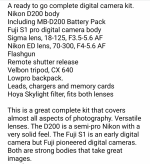Hi everyone, my name is Andy, living in Cornwall firstly.
I am looking to get much more involved in Photography. I have quite limited knowledge on the subject but I am keen to learn and understand more. This is day one, week one stuff so I'll apologies in advance if this causes any eye rolling.
I am interested in opinions on a good starting point for a first timer digital SLR that will last me a decent time before I may want to start getting something better. My interest initially is in landscapes, I also like the idea of night sky images.
I am also contemplating completing an online photography course. I know paying for a course to learn about something you can get secondhand for free off YouTube etc may seem daft, but I want to make sure I cover all angles and not just learn how others found their feet through trial & error in case I miss something important while tying myself in knots possibly.
I appreciate any tips and advice on any aspects of starter kits/cameras/lenses etc in advance.
Thanks
I am looking to get much more involved in Photography. I have quite limited knowledge on the subject but I am keen to learn and understand more. This is day one, week one stuff so I'll apologies in advance if this causes any eye rolling.
I am interested in opinions on a good starting point for a first timer digital SLR that will last me a decent time before I may want to start getting something better. My interest initially is in landscapes, I also like the idea of night sky images.
I am also contemplating completing an online photography course. I know paying for a course to learn about something you can get secondhand for free off YouTube etc may seem daft, but I want to make sure I cover all angles and not just learn how others found their feet through trial & error in case I miss something important while tying myself in knots possibly.
I appreciate any tips and advice on any aspects of starter kits/cameras/lenses etc in advance.
Thanks


